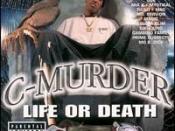Old age and death are especially subject to social taboo in contemporary society?' Explain why this is the case
It may be useful to first define the two main terms that will be studied. The first term is death; the Collins Dictionary defines death as the 'end of life'. Clinically this defined as there is a lack of heartbeat and breathing along with lack of central nervous system function which includes reflex activity and environmental responsiveness. If no brain activity is recorded after an initial measurement and a second measurement twenty-four hours later the individual in question is termed brain dead. Taboo refers to something which is forbidden or unmentionable, not by law but rather by custom. A strong taboo is one where something is unthinkable and its existence denied, a weak taboo is one where the subject is simply not spoken of.
More insulated from death than in the past, most people are uncomfortable with talking about this subject which has become a taboo in western society, this is more so the case when speaking of the prospect of one's own death.
This discomfort is shown even in the euphemisms people use such as 'sleep, pass away and rest', rather than the word death itself. . Our societies have banished 'death' from their vocabulary, we have promoted happiness and material possession, and any divergence from them is judged to be problematic or unnatural.
"Death has become unnameable. Everything henceforth goes on as if neither I nor those dear to me are any longer mortal. Technically, we might admit that we will die...But really, at heart we feel we are non-mortals. And surprise! Our life is not as a result gladdened!"
Aries
Life expectancy has increased, people expect to live to an older age and many will plan for it,


